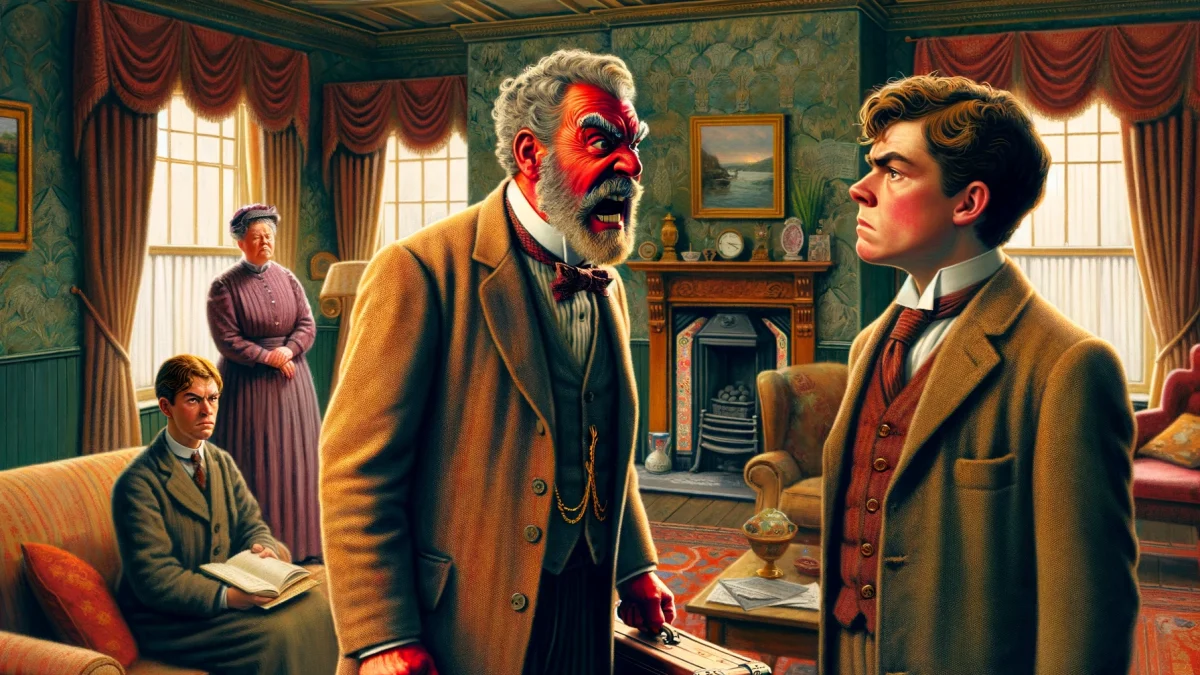DON QUIXOTE IN LONDON(ロンドンにおけるドン・キホーテ)
Simon Beecot was a country gentleman with a small income, a small estate and a mind considerably smaller than either. He dwelt at Wargrove in Essex and spent his idle hours—of which he possessed a daily and nightly twenty-four—in snarling at his faded wife and in snapping between whiles at his son. Mrs. Beecot, having been bullied into old age long before her time, accepted sour looks and hard words as necessary to God’s providence, but Paul, a fiery youth, resented useless nagging. He owned more brain-power than his progenitor, and to this favoring of Nature paterfamilias naturally objected. Paul also desired fame, which was likewise a crime in the fire-side tyrant’s eyes.
サイモン・ビーコットは田舎の紳士で、わずかな収入、わずかな財産、そしてどちらよりもはるかにわずかな知性しか持ち合わせていなかった。彼はエセックス州ウォーグローブに住み、暇な時間を—毎日24時間、夜も昼も—色あせた妻に怒鳴り散らし、合間に息子を叱りつけることに費やしていた。ビーコット夫人は、年老いる前に長年いじめられてきたため、不機嫌な表情と厳しい言葉を神の摂理として受け入れていたが、血気盛んな若者であるポールは、無駄な小言に憤慨していた。彼は父よりも多くの知性を持っていたが、この自然の恵みに対して父親は当然ながら異議を唱えていた。ポールはまた、名声を欲していたが、これもまた家庭内の暴君である父親の目には犯罪と映っていた。
As there were no other children Paul was heir to the Beecot acres, therefore their present proprietor suggested that his son should wait with idle hands for the falling in of the heritage. In plain words, Mr. Beecot, coming of a long line of middle-class loafers, wished his son to be a loafer also. Again, when Mrs. Beecot retired to a tearful rest, her bully found Paul a useful person on whom to expend his spleen. Should this whipping-boy leave, Mr. Beecot would have to forego this enjoyment, as servants object to being sworn at without cause. For years Mr. Beecot indulged in bouts of bad temper, till Paul, finding twenty-five too dignified an age to tolerate abuse, announced his intention of storming London as a scribbler.
他に子供がいないポールは、ビーコット家の土地の相続人であったため、現在の所有者である父親は、息子が遺産が転がり込んでくるのをただ待つべきだと提案した。つまり、ビーコット氏は、代々の中産階級の怠け者の家系に生まれたことから、息子にも怠け者になってほしいと願っていたのだ。さらに、ビーコット夫人が涙を流して休むと、夫はいらいらをぶつけるのに便利な相手としてポールを見つけた。このサンドバッグがいなくなれば、ビーコット氏は楽しみを諦めなければならないだろう。なぜなら、使用人は理由もなく罵倒されることを嫌がるからだ。ビーコット氏は長年にわたって不機嫌を爆発させてきたが、ポールは25歳という年齢は虐待に耐えるにはあまりにも立派な年齢だと考え、文筆家としてロンドンに乗り込むことを宣言した。
The parents objected in detail. Mrs. Beecot, after her kind, dissolved in tears, and made reference to young birds leaving the nest, while her husband, puffed out like a frog, and redder than the wattles of a turkey-cock, exhausted himself in well-chosen expressions. Paul increased the use of these by fixing a day for his departure. The female Beecot retired to bed with the assistance of a maid, burnt feathers and sal volatile, and the male, as a last and clinching argument, figuratively buttoned up his pockets.
両親は事細かに反対した。ビーコット夫人は、いつものように涙を流し、巣立つ若鳥に言及した。一方、夫はカエルのように膨れ上がり、七面鳥の肉垂よりも赤くなり、厳選された表現で自分を疲れ果てさせた。ポールは出発の日を決めることで、これらの表現の使用を増やした。ビーコット夫人は、メイドの助けを借りてベッドに退き、焦げた羽根と揮発性の塩で気を失った。そして夫は、最後にして決定的な議論として、比喩的にポケットのボタンを留めた。
“Not one shilling will you get from me,” said Beecot senior, with the graceful addition of vigorous adjectives.
「1シリングたりとも渡さんぞ」とビーコット親父は、力強い形容詞を優雅に加えて言った。
“I don’t ask for money,” said Paul, keeping his temper, for after all the turkey-cock was his father. “I have saved fifty pounds. Not out of my pocket-money,” he added hastily, seeing further objections on the way. “I earned it by writing short stories.”
「お金は頼んでいません」とポールは、結局のところ七面鳥は父親なのだからと、冷静さを保って言った。「50ポンド貯めました。小遣いからではありません」と、さらなる反論を予想して急いで付け加えた。「短編小説を書いて稼いだんです」。
“The confounded mercantile instinct,” snorted paterfamilias, only he used stronger words. “Your mother’s uncle was in trade. Thank Heaven none of my people ever used hands or brains. The Beecots lived like gentlemen.”
「忌々しい商業的本能だ」と父親は鼻を鳴らしたが、実際にはもっと強い言葉を使った。「お前の母の叔父は商売をしていた。ありがたいことに、私の家族は誰も手も頭も使ったことがない。ビーコット家は紳士のように暮らしてきたんだ」。
“I should say like cabbages from your description, father.”
「お父さんの説明からすると、キャベツのように暮らしてきたんですね」。
“No insolence, sir. How dare you disgrace your family? Writing tales indeed! Rubbish I expect” (here several adjectives). “And you took money I’ll be bound, eh! eh!”
「生意気言うな。よくも一族に恥をかかせたな。物語を書くなんて!くだらないことだ(ここでいくつかの形容詞)。そして金を取ったんだろう、え!え!」
“I have just informed you that I took all I could get,” said Beecot junior, quietly. “I’ll live in Town on my savings. When I make a name and a fortune I’ll return.”
「さっき、取れるものは全部取ったと言ったばかりです」とビーコット息子は静かに言った。「貯金で都会で暮らします。名を成し、財産を築いたら戻ってきます」。
“Never! never!” gobbled the turkey-cock. “If you descend to the gutter you can wallow there. I’ll cut you out of my will.”
「絶対に!絶対にだ!」と七面鳥はがなり立てた。「溝に降りるなら、そこで転げ回ればいい。お前を遺言から外してやる」。
“Very good, sir, that’s settled. Let us change the subject.”
「わかりました。話はこれで終わりにしましょう」。
But the old gentleman was too high-spirited to leave well alone. He demanded to know if Paul knew to whom he was talking, inquired if he had read the Bible touching the duties of children to their parents, instanced the fact that Paul’s dear mother would probably pine away and die, and ended with a pathetic reference to losing the prop of his old age. Paul listened respectfully and held to his own opinion. In defence of the same he replied in detail,—
しかし、老紳士は意気軒高で、放っておけなかった。彼はポールが誰と話しているのか知っているかどうかを尋ね、子供たちが親に対して果たすべき義務について聖書を読んだかどうかを尋ね、ポールの愛する母親はおそらくやつれて死ぬだろうという事実を例に挙げ、老後の支えを失うことへの哀れな言及で締めくくった。ポールは敬意を持って耳を傾け、自分の意見を貫いた。その弁護として、彼は詳しく答えた。
“I am aware that I talk to my father, sir,” said he, with spirit; “you never allow me to forget that fact. If another man spoke to me as you do I should probably break his head. I have read the Bible, and find therein that parents owe a duty to their children, which certainly does not include being abused like a pick-pocket. My mother will not pine away if you will leave her alone for at least three hours a day. And as to my being the prop of your old age, your vigor of language assures me that you are strong enough to stand alone.”
「父と話していることは承知しています」と彼は、気丈に言った。「あなたは私にその事実を忘れさせませんね。もし他の男があなたのように私に話しかけたら、私はおそらく彼の頭を割ってしまうでしょう。私は聖書を読みましたが、そこには親が子供に対して負うべき義務があることが書かれています。それは確かに、スリのように虐待されることを含むものではありません。母は、少なくとも1日に3時間、あなたに放っておいてもらえれば、やつれたりはしないでしょう。そして、私があなたの老後の支えになるということについては、あなたの言葉の勢いから、あなたは一人で立つのに十分なほど強いと確信しています」。
Paterfamilias, never bearded before, hastily drank a glass of port—the two were enjoying the usual pleasant family meal when the conversation took place—and said—but it is useless to detail his remarks. They were all sound and no sense. In justice to himself, and out of pity for his father, Paul cut short the scene by leaving the room with his determination unchanged. Mr. Beecot thereupon retired to bed, and lectured his wife on the enormity of having brought a parricide into the world. Having been countered for once in his life with common-sense, he felt that he could not put the matter too strongly to a woman, who was too weak to resent his bullying.
父親は、これまで一度もひげを生やしたことがなかったが、急いでポートワインを一杯飲んだ—二人はいつもの楽しい家族の食事を楽しんでいたときに会話が行われた—そして言った—しかし、彼の発言を詳しく説明するのは無駄だ。それはすべて健全で、意味をなさないものだった。ポールは、自分の正当性を主張するため、そして父親を哀れに思う気持ちから、決意を変えずに部屋を出て、この場面を打ち切った。ビーコット氏はそこでベッドに引き込み、妻に、なぜ人殺しをこの世に生み出したのかと説教した。人生で初めて常識で反論された彼は、いじめを恨むことのない弱い女性に、この問題をできるだけ強く訴えなければならないと感じたのだ。
Early next day the cause of the commotion, not having swerved a hair’s-breadth from the path he had marked out, took leave of his mother, and a formal farewell of the gentleman who described himself as the best of fathers. Beecot senior, turkey-cock and tyrant, was more subdued now that he found bluster would not carry his point. But the wave of common-sense came too late. Paul departed bag and baggage, and his sire swore to the empty air. Even Mrs. Beecot was not available, as she had fainted.
翌日早く、騒動の原因となった彼は、自分の決めた道から一歩も外れることなく、母親に別れを告げ、そして自らを最高の父親と称する紳士に正式な別れを告げた。七面鳥であり暴君であるビーコット親父は、威嚇しても目的が達せられないと悟り、以前よりも大人しくなっていた。しかし、常識の波は遅すぎた。ポールは荷物をまとめて出発し、父親は空に向かって悪態をついた。ビーコット夫人でさえ、気を失っていたので、利用できなかった。

